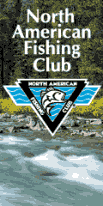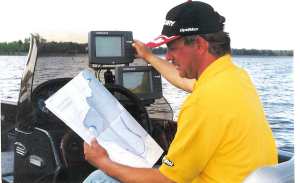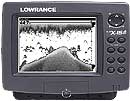 


















 
Free 90 day Risk free trial offer click
here

|
Mastering the Mystery
By John Kolinski
Editor’s note: John Kolinski is an eight-time championship qualifier
during
his seven years of professional fishing on the Professional Walleye
Trail and
the Masters Walleye Circuit.
For most of us, retirement is about as far from reality as the neighbor’s
fish stories. That makes our days off, vacation time and weekends precious,
especially for those of us who enjoy an annual family fishing trip or a
getaway with th eguys or gals. When time is limited, angling is all about
efficiency. Nobody wants to spend any more time than necessary searching
for cooperative fish. Sometimes, that keeps anglers from exploring unfamiliar
bodies of water. I’ve often heard friends and acquaintances say they’d
like nothing better than to take their gang to one of the country’s premier
walleye waters like Bay de Noc, Fort Peck, Lake of the Woods or Mille Lacs.
Instead, their fear of the unknown usually leads them to the comfort of
their traditional destinations.
It doesn’t have to be that way. With the information and technology
available
today, there’s no reason an angler can’t be successful on any body
of water
in the country. As a tournament angler on the Professional Walleye
Trail and Masters Walleye Circuit, I’ve had plenty of opportunities to
attack new water over the years. A few basic guidelines can help lend some
method to what often becomes madness for many.
The first step is gathering information. It can come from numerous
sources,
and it will give you a foundation with which to work before you ever
leave
home. You’ll have an idea what type of fishing you’ll be doing over
what type
of structure in what part of the lake, river or reservoir you plan
to visit. A good starting point is the Internet. There are web sites today
that are species-specific, providing information and fishing reports on
everything from walleye and bass to catfish, trout and salmon. Other sites
are location-specific and will fill you in on everything that’s been happening
on a particular body of water. Most of these sites have message boards
where dozens of anglers post reports and offer tips every day. However,
the quality and depth of information you can glean from the Internet can
be sketchy if there’s an upcoming tournament. It’s also a good idea
to contact a couple of bait shops in the immediate area.
 |
One of the first questions I ask is what kind of contour maps are available.
On more noted bodies of water, Fishing
Hotspots maps are a good source of information, but sometimes there
are better maps that are produced locally. |
I’ve even had tackle and bait shop owners or their employees mark hot spots
or make note of seasonally productive areas before dropping the maps in
the mail.
Other questions you’ll want to ask are:
What time of year is the best bite?
What kind of quality can you expect in the fish you catch? Is it a lake
where 14-inchers are easy to catch, but fish over three pounds become
rare at
certain times of the year?
What is the main forage base? The answer to that question will help you
narrow down the potential baits you will use as you try to match that
forage.
Does the body of water in question have a particular bait that seems to
work best? There’s no question that occurs as my experiences have shown
with
Hot ‘n Tots on Saginaw Bay, Reef Runners on Lake Erie and Shad Raps
on the
Mississippi River.
What type of structure seems to be holding the walleyes, and what part
of
their seasonal pattern will they likely be in when you arrive? This
information can help you narrow down a lake to a specific section or
a
specific type of structure and save you hours of unproductive angling.
Once you’ve consumed all that information, you can begin to build a
basic
plan of attack. When you get the contour maps in your hands you can
make note of structures like dominant points, inside turns on river systems,
old channels that run tight to shore, areas of rock and rubble and weedlines.
Judging by the latitude of the lake, ice-out and depth, you can get
a good
idea of when walleyes spawn there. By looking for creeks and rivers
that run
into lakes, rocky points and reefs or hard-bottom areas on rivers,
you’ll
have an idea where those fish spawn.
From there, it’s a matter of working your way backward to your arrival.
If it’s a postspawn situation (within a month or so of the primary
spawn),
you’ll be looking for shallower areas of the system where recuperating
fish
can feed easily without expending a lot of energy. Add another week
or two
and you’ll be looking at more of a summer pattern where walleyes will
likely
be relating more to dominant points or weed edges.
Late summer usually sends the fish deeper along defined breaklines
or even
causes them to suspend over open water.
 |
Late summer usually sends the fish deeper along defined breaklines
or even causes them to suspend over open water. With a 480x350 pixel display,
the degree of resolution provides detail that Quality electronics, like
Lowrance’s
new X-15 unit, are essential to solving this puzzle. |
A good unit will indicate the presence of important weedlines, as well
as baitfish and any fish that might be following them.
Many times when I suspect there are fish suspending in such a situation,
I
run my boat out into open water, then slow down to an idle while I
study my
electronics, repeating the procedure every quarter-mile or so. When
I find
baitfish, I usually find walleyes, even when they don’t show up on
the
electronics because they’re moving away from the approaching boat.
If you see
baitfish, stop and fish just above them. You’ll know a lot more about
where you’ll be fishing once you arrive. Talk again to bait shop owners
and resort owners. They know what’s going on and they want to see you catch
fish and have a good time as much as you want that to happen. Their livelihood
depends on it. If a couple of people mention the same location or pattern,
that’s something you want to take an immediate look at. If they all mention
different areas, those are places you’ll push farther down your list.
When you are inside a bait or tackle shop, scan the displays and see
what
type of lures are selling. If most of the No. 7 chartreuse  Shad Raps are gone, that’s probably the bait that’s working best at that
time.
Shad Raps are gone, that’s probably the bait that’s working best at that
time.
Take a ride around the lake. See where others are fishing. Stop at
the boat
ramps and ask other anglers how they’ve done. If there’s a fish-cleaning
house in the area, stop by and see what kind and size of fish are being
cleaned. If nobody’s there but there are plenty of people fishing,
peek into
the trash can or dumpster to see what’s been going on. Sometimes, you
can
even learn what the fish have been feeding on.
Finally, make sure your equipment is dependable and in good working
order
before you head to a new destination. Finding service in a foreign
area can
be frustrating and costly. That’s something I never worry about with
my
Triton 205 and Mercury motors. They always seem to answer the call.
There are far more reasons to take on new adventures in fishing than
there
are to avoid them. If you do a little homework and pay attention to
details
when you arrive, chances are you’ll be outfishing the locals.
E-mail
John Kolinski

Walleyes Inc. web site is maintained
by Randy
Tyler Fishing the In-Fisherman Professional Walleye Circuit, Masters
Walleye Circuit, RCL and the Team Walleye Circuit. All rights reserved.
Copyright 1999/2001
Please visit these site sponsors
Daiichi/Tru-Turn Hooks,
Lindy
Little Joe,
R-A.M Mounting Systems,
Ranger
boats, Mercury Marine, Bedford
Sales , Hamby's Beaching Bumpers,
Goldeneye
Marine products, Panther
Marine Products, Webfoots body
sock, Bait Rigs Tackle
|




